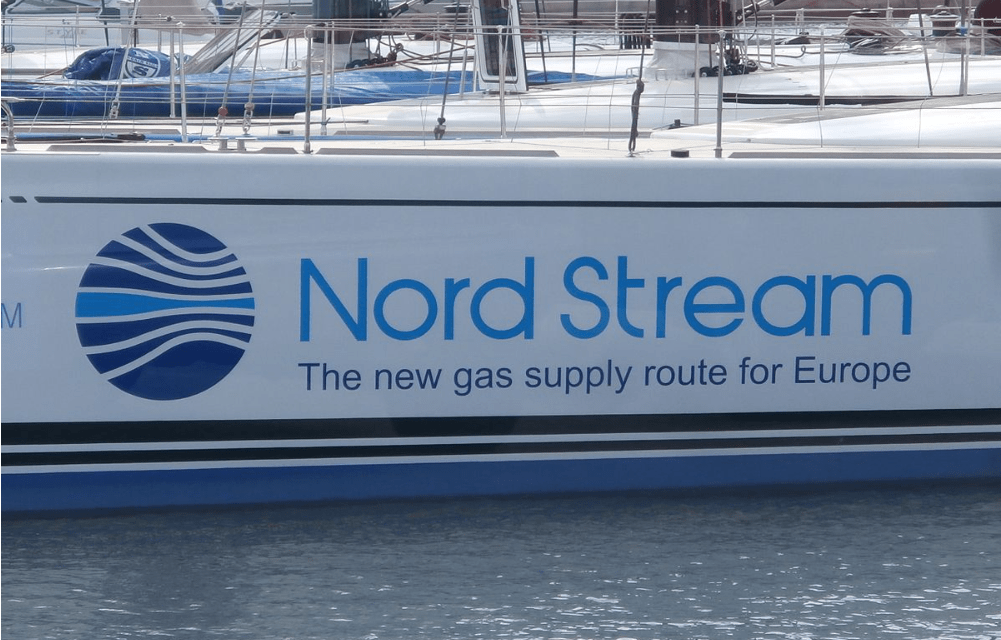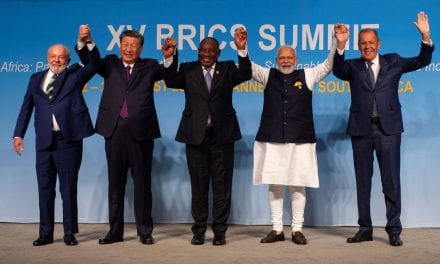On September 26, 2022, powerful explosions destroyed three out of the four Nord Stream pipelines, severing Germany from its main source of energy. [1] Jeffery Sachs, Columbia University Professor, classified the Nord Stream sabotage as an act of international terrorism at a United Nations Security Council meeting on February 21, 2023. [2] He noted that the state actor(s) responsible for the sabotage required a “high degree of planning, expertise, and technological capacity,” and needed access to the Baltic Sea. Because the sabotage had major consequences for German-Russian relations, gas prices, the Ukraine War, and the environment, it is vital that the international community holds the perpetrator to account. There is limited access to information making this endeavor difficult. Utilizing the evidence currently available, the United States and Ukraine were likely involved in the planning and execution of the sabotage.
On September 8, 2005, German Chancellor Gerhard Schröder met with Vladimir Putin to discuss an important project, the construction of a new set of natural gas pipelines. [3] These pipelines would run through the Baltic Sea routes thus bypassing Ukraine, Belarus, Poland, and the Baltic States. This benefited Russia as it eliminated transport fees and mitigated those countries’ economic leverage over Moscow. The Kremlin no longer needed the consent of Eastern European countries to tap into the profitable German market. In return, Germany enjoyed a steady supply of cheap liquified natural gas (LNG) and prepared to conduct further business with Gazprom, a majority state-owned Russian energy company. Companies such as E.ON planned on collaborating with Russian firms in the future, with the extraction of LNG in Siberia being a priority.
Nord Stream AG is the joint venture responsible for the construction of the Nord Stream pipelines. Gazprom has a 51% stake in the project whereas German gas companies, such as BASF/Wintershall, E.ON, NV Nederlandse Gasunie and GDF Suez, contributed the remaining investments. [4] Nord Stream 1 is a twin-pipeline project that became fully operational in 2012, running from Narva Bay (Russia) to Greifswald (Germany) via the Baltic Sea. Nord Stream 1 had the capacity to transport 55 billion cubic meters of LNG to Germany every year. In June 2015, Chancellor Angela Merkel approved a second set of twin pipelines, known as Nord Stream 2, which doubled the capacity to transport LNG to Germany. Construction of Nord Stream 2 was completed in 2021, but Germany delayed its use two days before the Kremlin’s invasion of Ukraine.
Germany received 55% of its LNG from Russia prior to the war, but because Germany supported Ukraine, Putin cut off 75% of the LNG flowing through Nord Stream 1 in the summer of 2022. [5] It is estimated that Germany had to pay an additional USD 1.5 billion a day for other sources of energy because of Putin’s actions. [6] With over half of German homes using gas for heating, it was feared that many lower income families would be unable to afford their energy bills in the winter months due to the rising LNG prices. [7] In response to the energy crisis, German Chancellor Olaf Scholz announced a 65 billion dollar relief package to help mitigate the economic burden. [8] The package included one time payments to families, tax breaks for energy intensive industries, and cheaper transportation costs. The rapid policy shift in response to the energy crisis demonstrated the immense leverage Russia had due to its natural resources. Putin would have continued to exploit Germany’s reliance on Russian LNG throughout the war in the hopes of diminishing Berlin’s support for Ukraine. However, it is unclear whether Putin’s strategy would have been successful as the Nord Stream sabotage occurred before the winter came about.
Acknowledging the disastrous consequences to the environment, the lack of urgency to bring the perpetrator to justice is appalling. Methane, the main component of liquified natural gas (LNG), is 80 times more effective at trapping heat in the atmosphere than carbon dioxide. [9] Although natural gas was not actively flowing, a substantial amount was still in the pipelines and thus entered the atmosphere following the sabotage. According to the Danish government, an estimated 1⁄2 million metric tons of methane was released into the atmosphere. The leak was equivalent to burning a billion gallons of gasoline and was approximately 5 times worse than the infamous Alison Canyon leak in 2015. The destruction of the Nord Stream pipelines will without a doubt have long lasting consequences on the surrounding environment and the climate as a whole.
When examining suspects for acts of international terrorism it is important to identify the states with the strongest motives. Countries that immediately came under scrutiny were Russia, the United States, and Ukraine. The West, and particularly the United States, assumed that the Kremlin was behind the sabotage as it aligned with their preconceived notions of Russian aggression. Many U.S and EU officials cited Russia as being the most likely perpetrator, despite a lack of evidence and motives. For example, when asked if Russia was behind the attack, Ex – CIA Director John Brennan said “Russia does have an undersea capability that would easily lay explosive devices by those pipelines, and I do think it is a signal to Europe that Russia could reach beyond Ukraine’s borders […] Russia is certainly the most likely suspect.” [10] The CNN host responded with the obvious question “Why blow up their own pipelines? If they can obviously just cut off the gas flowing from them.” Brennan, alongside most U.S officials, argued that Russia destroyed the Nord Stream pipelines as a threat, displaying that it could destroy other energy infrastructure in the Baltic Sea region. But this is a weak assessment, as NATO was already aware of Russia’s military capabilities, and the costs of destroying profitable infrastructure would have been too high for the Kremlin. Furthermore, it seems illogical to consider Russian culpability given that the Nord Stream pipelines were Putin’s main source of leverage over Germany and the European Union.
To further complicate this theory, Russia and China called for a UN investigation in February, 2023. [11] They proposed a resolution that would establish an independent international commission of lawyers to investigate which state was responsible for the terrorist act. Surely the Kremlin would not be urging for investigations and justice if it were the perpetrator. Furthermore, a European official, along with 23 diplomatic and intelligence officials from nine countries, believe “there is no evidence at this point that Russia was behind the sabotage.” [12] The Biden Administration has reluctantly admitted to the lack of evidence implicating Russia in recent weeks.
Considering the importance of German – Russian relations to the state of the war, Ukraine became an immediate suspect following the sabotage. The destruction of the Nord Stream pipelines greatly benefitted Ukraine because Russia lost its leverage over Germany. Ukraine has received substantial economic and military assistance from Germany since the war’s inception, but the potential resupply of LNG from Russia to Germany could have jeopardized Germany’s support for Kyiv. Because the energy crisis caused economic hardship within Germany, the West feared the German government would capitulate to Russia’s demands as the winter months would exacerbate an already dire energy crisis. Thus it was in Ukraine’s interest to eliminate Putin’s energy infrastructure to undermine the Kremlin’s leverage over Berlin. Furthermore, as a leader in the EU, Germany has significant influence over Europe’s level of retaliation against Russia. The destruction of the pipelines thus solidified European support for Ukraine to counter Russia’s invasion.
In early March, U.S officials announced the possession of intelligence implicating Ukrainian nationals in the sabotage. [13] The officials asserted that an unaffiliated Ukrainian group aided in the destruction of the pipelines, but did not act on the behalf of any Ukrainian officials or state actors. Besides this they have withheld any further information on the intelligence. German intelligence got a “very concrete tip” from an undisclosed western ally about a boat that was potentially used during the sabotage. [14] German investigators searched the Andromeda, a 50 foot sailing boat, and found explosives that matched the ones used during the sabotage. The Andromeda yacht is linked to a Polish company with connections to a prominent Ukrainian, according to the German investigation. While the evidence supports the U.S claims that the sabotage is connected to a Ukrainian group, many EU and U.S officials have remained skeptical of these new revelations.
As noted by Sachs and other scholars, the Nord Stream sabotage required a high level of sophistication likely implicating a state actor. It is not expected that a ragtag team of Ukrainian divers could execute such a complex mission. U.S officials claim that 6 non-state affiliated actors planted hundreds of pounds of explosives 200 feet below the water. [15] While technically possible, such an operation with limited personnel and equipment would have required multiple diving trips to secure all the explosives by hand. This entails the Andromeda hovering over the spot of the sabotage for hours without being detected. Also, Ukraine does not have access to the Baltic sea meaning these explosives would have had to be transported hundreds of miles from Ukraine to the shore.
Furthermore, various EU officials have raised concerns over the reliability of these revelations, highlighting that the perpetrators would not leave incriminating evidence behind for months on end [16]. The evidence was not collected as part of the German investigation but rather handed to German officials by an undisclosed western ally. This allows for the possibility of a state actor planting misleading evidence to derail investigations that would expose their culpability. While the U.S intelligence claims cannot be dismissed, these assertions should be taken with a high degree of skepticism.
To further undermine the theory regarding the unaffiliated group of Ukrainians, an alleged intelligence report contradicts the U.S narrative. The Washington Post reported that the CIA was informed of the planned sabotage via a European Spy Agency in June, 2022. [17] The Washington Post obtained this information via the “Discord Leaks”, a collection of classified information allegedly leaked by 21-year old Jack Teixeira, an Air National Guard member. Based on information obtained from an unspecified Ukrainian individual, the intelligence report describes a detailed plan of destroying the pipelines, which includes the number of operatives and the methods for destroying the infrastructure. If the report is confirmed this means the CIA and Biden Administration were actively deceiving the public into believing the Kremlin was behind the Sabotage, since they were made aware of the suspect (Ukraine) months before the pipelines were bombed. Furthermore, this report indicates the United States allowed this operation to be carried out, despite it being an act of international terrorism and it drastically harming a strategic ally.
Whether these intelligence leaks reveal the totality of the terrorist attack is yet to be determined. What is clear is that the narrative distributed by U.S officials and the mainstream press has been misleading. Since the sabotage has occurred, all of the information distributed to the public has been aimed to undermine any rhetoric implicating the West. Russia was initially framed as the culprit but a lack of evidence forced the Biden Administration to concede the improbability of their involvement. Once Russia was no longer the suspect, U.S officials asserted that an independent group of Ukrainians were responsible, but the sophistication required for the operation quickly undermined this theory as well. Now the prevailing theory is that Ukraine is responsible but acted alone. The only possibility that has been ignored by U.S officials and the press is that the United States aided in the sabotage.
Unlike the Russian Federation, the United States had a strong motive for destroying the pipelines. The United States has opposed the Nord Stream Pipelines since its inception, citing security concerns regarding Russian aggression. In 2017, Congress passed the Countering Russian Influence in Europe and Eurasia Act, which implemented sanctions on individuals and institutions investing at least USD 1 million for the construction of the pipelines. [18] On January 19, 2021, the Trump Administration imposed sanctions on the Russian Vessel Fortuna, which had an integral role in the construction of Nord Stream 2. The Biden Administration implemented further sanctions on Nord Stream AG, the CEO, and corporate officers the day before Russia’s invasion on February 24, 2022. The United States correctly feared that Russia would use the Nord Stream pipelines as an economic weapon against Germany. As the economic powerhouse of Europe and a leader of the EU, it is vital to U.S interests that Germany does not capitulate to Russian demands. Without German cooperation, Ukraine’s future in the face of Russian aggression is dismal. While such concerns are valid, as demonstrated by the German energy crisis, Washington’s repeated opposition to Nord Stream reveals a strong motive for sabotage.
Besides the geopolitical benefits, the sabotage opened up a profitable market for LNG exporters. U.S exports of LNG increased by 141% in 2022 compared to 2021, due to rising LNG prices and increased demand in Europe. [19] The United States exported 60% of its LNG to Europe in 2022 compared to just 20% in 2021, highlighting the immense economic opportunities derived from the sabotage. [20] Some argue that the rising LNG prices have hurt the United States because LNG imports cost more. While the cost of LNG imports have risen, the United States has overall profited because it is an LNG net exporter, meaning it exports more LNG than it imports. In fact, the United States became the world’s biggest LNG exporter due to rising demand caused by the Nord Stream sabotage. [21] The 200 million dollar profit margin per LNG shipment, which is directly correlated to increased LNG prices, has greatly benefited the U.S economy. [22] Furthermore, the United States gains more leverage over Europe by being its main energy supplier.
The clarity of a U.S motive is best displayed through President Biden’s own words. Biden warned that if Russia invaded Ukraine that there would “no longer be a Nord Stream 2 pipeline. We will bring an end to it.” [23] Since the Nord Stream AG has no U.S stakes in it, meaning the United States has no control over the project, one can only wonder how “bringing an end” to Nord Stream could be accomplished. In response to Biden’s comments, the reporter asks “How will you do that exactly? Since the project, and the control of the project, is within Germany’s Control,” Biden simply responded with, “I promise you we will be able to do it.” [24]. The rhetoric following the destruction of the pipeline also draws suspicion to the United States. Instead of being outraged at an act of international terrorism, Antony Blinken, the United States Secretary of State, said that the sabotage “is a tremendous opportunity to once and for all remove the dependence on Russian energy.” [25] It is illogical to assume that Russia would commit an act that greatly benefits its adversary, the United States.
The United States has both the motives and the capabilities to carry out the sabotage. Frequent NATO exercises, close European alliances, and naval bases in the region all give the United States access to the Baltic Sea. Based on Flightradar 24, a Swedish service that displays aircraft tracking data, U.S naval helicopters hovered over the spot of the sabotage for hours from September 1st to 3rd and came back to the spot various times throughout the month. [26] Furthermore, Der Spiegel reported that the CIA told the German government that the pipelines were likely to be attacked in the near future back in the summer of 2022. [27] It is unclear what intelligence the CIA was basing this off due to the minimal information that has been shared with the public. While circumstantial evidence certainly points to U.S complicity, stronger evidence is needed to make any assertions. Whistleblowers often provide the evidence needed to expose state crimes, as highlighted by Edward Snowden and Chelsea Manning.
On February 8, 2023, award winning investigative journalist Seymour Hersh published an article claiming that the United States was responsible for the Nord Stream sabotage. [28] Hersh has won a Pulitzer Prize, five George Polk Awards, two National Magazine Awards, and more than a dozen other prizes for investigative reporting. [29] Hersh has been hailed for his uncovering of the Mi Lai massacre in Vietnam and U.S crimes conducted at Abu Ghraib. In his latest article, Hersh claims that Navy divers planted bombs on the pipelines during BALTOPS 22, a NATO military exercise conducted in the Baltic Sea during June every year. The bombs were then set off three months later to mitigate suspicion.
Hersh also claims Norway was in collaboration with the U.S and became a base of operations for the mission. He suggests that heavy investment on behalf of the U.S, Norway’s historic anti-Russia stance, devotion to NATO, and desire to increase LNG exports to Europe, are all reasons for their collaboration. These bold revelations should be taken skeptically as Hersh uses an anonymous source with “direct knowledge of the operational planning”. [30] However, in this case, the anonymity of the source is essential as communicating classified information is a criminal offense. While these claims are unverifiable, Hersh maintained a high reputation throughout his career and thus these claims should be further investigated.
Even though the perpetrator has not been held to account, there has been a lack of urgency on behalf of NATO members to investigate. The United States has criticized Russia and China’s resolution, with the U.S minister John Kelly saying that it was a “blatant attempt to distract” the public from Russian aggression in Ukraine. [31] Such rhetoric displays a conscious effort to prevent transparency regarding the ongoing investigations. It is possible to simultaneously investigate the Nord Stream sabotage while holding Russia accountable for its crimes in Ukraine.
Nevertheless, the Security Council rejected Russia’s resolution with 3 countries supporting it and the other 12 abstaining. The majority of the abstaining votes repeatedly cited their unwillingness to vote out of the concern of undermining Germany, Sweden, and Denmark’s investigations. The proponents of the resolution assert that transparency can only be assured through the creation of an independent UN commission. The Russian Federation has voiced its skepticism over the transparency of the investigation, citing Sweden’s unwillingness to share its forensic evidence as proof of a sham investigation [32]. Sweden asserts that their findings pertain to national security and thus cannot be shared with the public. Whether the investigation is compromised or not, it cannot be disputed that the current investigation has been underwhelming in its findings. Proponents of the resolution, such as Brazil, assert that the creation of an independent commission strengthens the investigation process rather than undermining it. The creation of an independent UN commission does not prevent Germany, Sweden, and Denmark from continuing their own investigations.
If the sabotage was indeed a U.S operation, Germany would be unmotivated to retaliate due to its reliance on the U.S.. Germany is currently a close trading partner of the United States with bilateral trade totaling 260 billion dollars in 2019. [33] The two countries are also in numerous international organizations together such as NATO, the G-7, the G-20, the Organization on Security and Cooperation in Europe (OSCE), and the United Nations. Since World War II, defense spending has been a low priority for Germany due to its dark militaristic past and guaranteed protection by the United States. In 2014, during a NATO summit, all members agreed to spend a minimum of 2% of their GDP on defense. [34] Despite the promises, only four countries met the threshold in 2017, and 10 by 2021. The United States is by far the biggest contributor to NATO, not only by total expenditures but also by percentage of GDP which was 3.6% in 2017.
Despite pledges from Chancellor Olaf Scholz to reach the 2 percent threshold, Germany spent only 1.4% of GDP in 2022. [35] Germany made a substantial policy shift since the Ukraine war, but even with their USD 105 billion fund towards the military, it will take years till Germany’s defense budget will reach the 2% threshold. Decades of neglect has made Germany’s military notoriously weak. While focus on the economy and social benefits might have increased prosperity within the country, it has also made it reliant on the United States for security. Because the United States shares ideological goals, is a major trading partner, and a guarantor of security, Germany is unlikely to be antagonistic to its ally. This makes the investigation of the sabotage particularly difficult. It is likely that German intelligence would be aware of U.S culpability if the United States was involved. However, it is unlikely Germany would share this information with the international community due to the damaging effects it would have with its relationship with Washington.
If it is proven that the sabotage was a U.S operation this would undermine bilateral relations within many European states. The economic downturn for Germany was severe and thus would expose an egocentric U.S foreign policy. U.S culpability would erode much trust within the NATO states thus undermining the U.S’ geopolitical clout. For these reasons, it would be in Washington’s interest to suppress any evidence implicating the United States. However, such extrapolations should be made with caution as the international community has yet to identify the full details of the sabotage. Due to limited evidence and transparency regarding the sabotage, it is difficult to make assertions without speculation. While the available evidence indicates U.S and Ukrainian culpability, future revelations could alter the calculus. Regardless of one’s views on the subject, there should be a consensus that more thorough investigations are needed.
There are too many private, financial, and geopolitical interests involved for the truth to become publicly known. Narratives have the power to shape public opinion and determine the outcome of foreign policy. As an extension of the Ukraine war, the public’s perception of the Nord Stream sabotage is consequential to the fate of Ukraine itself. Because of the pervasive manipulation of information via state actors, it is the public’s duty to demand a more thorough investigation to finally uncover the true details of the sabotage. Significant human and environmental costs can be attributed to the destruction of the pipelines and thus the perpetrator must be held to account.
References
[1] Merlyn, Thomas. 2022. “Nord Stream blast blew away 50 meters of pipe”. BBC News. https://www.bbc.com/news/world-europe-63297085
[2] United Nations. 2023. “Avoid Speculation’ about Responsibility for 2022 Nord Stream Pipeline Incident, Official Urges Security Council, Stressing United Nations Cannot Verify Claims”. https://press.un.org/en/2023/sc15206.doc.htm
[3] Knight, Ben. 2021. “The history of Nord Stream”. Deutsche Welle. https://www.dw.com/en/the-history-of-nord-stream/a-58618313
[4] Hydrocarbons Technology. “Nord Stream Gas Pipeline (NSGP), Russia – Germany”. https://www.hydrocarbonstechnology.com/projects/negp/#:~:text=The%20first%20pipeline%2C%20which%20has,deliveries%20began%20in%20November%202012\
[5] BBC. 2022. “Nord Stream 1: How Russia is cutting gas supplies to Europe”. https://www.bbc.com/news/world-europe-60131520
[6] Steitz, Christoph. 2022. “Germany’s half-a-trillion dollar energy bazooka may not be enough”. Reuters. https://www.reuters.com/business/energy/germanys-half-a-trillion-dollar-energy-bazooka-may-not-be-enough-2022-12-15/
[7] Eddy, Melissa. 2022. “Germany’s Energy Crisis is a Cue to Chop Wood and Stock Up”. The New York Times. https://www.nytimes.com/2022/12/25/business/germanys-energy-crisis-is-a-cue-to-chop-wood-and-stock-up.html
[8] Solomon, Erika. 2022. “Scholz announces a 65 billion relief package for Germany”. https://www.nytimes.com/2022/09/04/world/europe/scholz-germany-inflation-energy.htm
[9] Benshoff, Laura. 2022. “The Nord Stream pipelines have stopped leaking. But the methane emitted broke records”. NPR News. https://www.npr.org/2022/10/04/1126562195/the-nord-stream-pipelines-have-stopped-leaking-but-the-methane-emitted-broke-rec
[10] CNN. 2022. “Ex – CIA director shares the most likely suspect for the Nord Stream leaks”. https://www.youtube.com/watch?v=9p6mWnT8G2c
[11] The Maritime Executive. 2021. “China Joins Russia in Calling for UN Probe of Nord Stream Blasts”. https://maritime-executive.com/article/china-joins-russia-in-calling-for-un-probe-of-nord-stream-blasts
[12] Harris, Shane. 2022. “No conclusive evidence Russia is behind Nord Stream attack”. The Washington Post. https://www.washingtonpost.com/national-security/2022/12/21/russia-nord-stream-explosions/
[13] Entous, Adam. 2023. “Intelligence Suggests Pro-Ukrainian Group Sabotaged Pipelines, U.S officials say”. https://www.nytimes.com/2023/03/07/us/politics/nord-stream-pipeline-sabotage-ukraine.html
[14] Harris, Shane. 2023. “Investigators Skeptical of yacht’s role in the Nord Stream bombing”. Washington Post. https://www.washingtonpost.com/national-security/2023/04/03/nord-stream-bombing-yacht-andromeda/
[15] Harris, Shane. 2023. “Investigators Skeptical of yacht’s role in the Nord Stream bombing”. Washington Post. https://www.washingtonpost.com/national-security/2023/04/03/nord-stream-bombing-yacht-andromeda/
[16] Harris, Shane. 2023. “Investigators Skeptical of yacht’s role in the Nord Stream bombing”. Washington Post. https://www.washingtonpost.com/national-security/2023/04/03/nord-stream-bombing-yacht-andromeda/
[17] Harris, Shane and Souad Mekhennet. 2023. “U.S. had intelligence of detailed Ukrainian plan to attack Nord Stream pipeline.” Washington Post. https://www.washingtonpost.com/national-security/2023/06/06/nord-stream-pipeline-explosion-ukraine-russia/
[18] Congressional Research Service. 2022.”Russia’s Nord Stream 2 Natural Gas Pipeline to Germany Halted”. https://crsreports.congress.gov/product/pdf/IF/IF11138#:~:text=Successive%20Congresses%20and%20U.S.%20Administrations,and%20Russian%20aggression%20in%20Ukraine.
[19] U.S Energy Information Administration. 2023. “Europe was the main destination for U.S LNG exports in 2022. https://docs.google.com/document/d/1hOORl82rOpZ9WHAmTkMxUA-V4ixZv6p3gRKkB8meV0A/edit
[20] Robertson, Harry. 2022. “Energy traders are making a killing exporting US natural gas to Europe as prices soar – with some single shipments bringing in $200 million”. https://markets.businessinsider.com/news/commodities/us-natural-gas-exports-europe-surge-energy-crisis-trader-profits-2022-8
[21] Walton, Robert. 2022. “US becomes world’s largest LNG exporter amid Ukraine war-driven demand, rising gas and power prices”. UtilityDive. https://www.utilitydive.com/news/us-becomes-worlds-largest-lng-exporter-amid-ukraine-war-driven-demand-ris/628106/#:~:text=Amid%20rising%20global%20energy%20prices,Energy%20Information%20Administration%20said%20Monday.
[22] Robertson, Harry. 2022. “Energy traders are making a killing exporting US natural gas to Europe as prices soar – with some single shipments bringing in $200 million”. https://markets.businessinsider.com/news/commodities/us-natural-gas-exports-europe-surge-energy-crisis-trader-profits-2022-8
[23] Associated Press. 2022. “Biden: No Nord Stream 2 pipeline if Russia invades”. https://www.youtube.com/watch?v=k8YC7UQVmis
[24] Associated Press. 2022. “Biden: No Nord Stream 2 pipeline if Russia invades”. https://www.youtube.com/watch?v=k8YC7UQVmis
[25] Democracy Now! 2022. “Putin Blames U.S. for Sabotaging Nord Stream Pipelines; Blinken Cites Development as “Tremendous Opportunity”. https://www.democracynow.org/2022/10/3/headlines/putin_blames_us_for_sabotaging_nord_stream_pipelines_blinken_cites_development_as_tremendous_opportunity
[26] Al Mayadeen. 2022. “US military aircraft circled the Nord Stream incident site in September”. https://english.almayadeen.net/news/politics/us-military-aircraft-circled-nord-stream-incident-site-in-se
[27] Duffy, Kate. 2022. “The CIA warned Germany weeks ago about a possible attack on the Nord Stream natural-gas pipelines, report says”. Insider. https://www.businessinsider.com/cia-warned-germany-attacks-nord-stream-pipelines-leak-sabotage-report-2022-9
[28] Hersh, Seymour. 2023. “How America took out the Nord Stream Pipeline”. https://seymourhersh.substack.com/p/how-america-took-out-the-nord-stream
[29] The New Yorker. “Seymour M. Hersh” https://www.newyorker.com/contributors/seymour-m-hersh
[30] Hersh, Seymour. 2023. “How America took out the Nord Stream Pipeline”. https://seymourhersh.substack.com/p/how-america-took-out-the-nord-stream
[31] Lederer, Edith. 2023. “Russia and West clash over probe of Nord Stream sabotage”. https://apnews.com/article/politics-united-nations-germany-sweden-denmark-eaddc9fbc0b1a60c74f9d18dc5561626
[32] Hanschke, Hannibal. 2022. “Sweden won’t share Nord Stream investigation findings with Russia”. Reutershttps://www.reuters.com/world/europe/sweden-wont-share-nord-stream-investigation-findings-with-russia-pm-2022-10-10/
[33] U.S Department of State. 2023. “U.S Relations with Germany”. https://www.state.gov/u-s-relations-with-germany/
[34] World Population Review. 2023. “NATO Spending by Country 2023”. https://worldpopulationreview.com/country-rankings/nato-spending-by-country
[35] Clements, Benedict, Sanjeev Gupta, and Saida Khamidova. 2023. “What Makes Military Spending Rise? It’s Economic Growth—and What That Means for Future Geopolitics”. Center for Global Development. https://www.cgdev.org/blog/what-makes-military-spending-rise-its-economic-growth-and-what-means-future-geopolitics#:~:text=The%20war%20in%20Ukraine%20in,to%201.4%20percent%20of%20GDP







